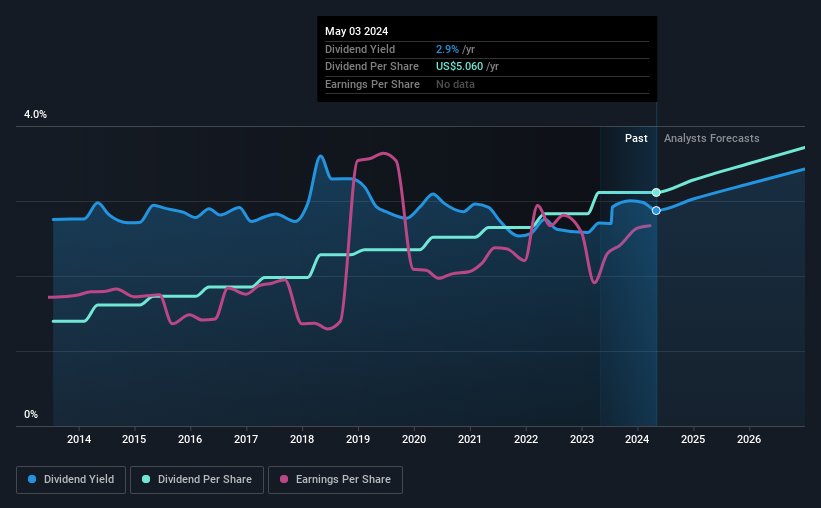PepsiCo's (NASDAQ:PEP) Upcoming Dividend Will Be Larger Than Last Year's
The board of PepsiCo, Inc. (NASDAQ:PEP) has announced that the dividend on 28th of June will be increased to $1.36, which will be 7.1% higher than last year's payment of $1.26 which covered the same period. This takes the annual payment to 2.9% of the current stock price, which is about average for the industry.
View our latest analysis for PepsiCo
PepsiCo's Earnings Easily Cover The Distributions
We like a dividend to be consistent over the long term, so checking whether it is sustainable is important. Prior to this announcement, PepsiCo's dividend was making up a very large proportion of earnings and perhaps more concerning was that it was 96% of cash flows. This is certainly a risk factor, as reduced cash flows could force the company to pay a lower dividend.
The next year is set to see EPS grow by 41.1%. Assuming the dividend continues along the course it has been charting recently, our estimates show the payout ratio being 59% which brings it into quite a comfortable range.
PepsiCo Has A Solid Track Record
Even over a long history of paying dividends, the company's distributions have been remarkably stable. Since 2014, the dividend has gone from $2.27 total annually to $5.06. This works out to be a compound annual growth rate (CAGR) of approximately 8.3% a year over that time. Dividends have grown at a reasonable rate over this period, and without any major cuts in the payment over time, we think this is an attractive combination as it provides a nice boost to shareholder returns.
Dividend Growth Is Doubtful
The company's investors will be pleased to have been receiving dividend income for some time. Unfortunately things aren't as good as they seem. Over the past five years, it looks as though PepsiCo's EPS has declined at around 5.6% a year. If the company is making less over time, it naturally follows that it will also have to pay out less in dividends. It's not all bad news though, as the earnings are predicted to rise over the next 12 months - we would just be a bit cautious until this can turn into a longer term trend.
The Dividend Could Prove To Be Unreliable
Overall, this is probably not a great income stock, even though the dividend is being raised at the moment. We can't deny that the payments have been very stable, but we are a little bit worried about the very high payout ratio. We don't think PepsiCo is a great stock to add to your portfolio if income is your focus.
Companies possessing a stable dividend policy will likely enjoy greater investor interest than those suffering from a more inconsistent approach. Meanwhile, despite the importance of dividend payments, they are not the only factors our readers should know when assessing a company. Taking the debate a bit further, we've identified 3 warning signs for PepsiCo that investors need to be conscious of moving forward. Looking for more high-yielding dividend ideas? Try our collection of strong dividend payers.
Have feedback on this article? Concerned about the content? Get in touch with us directly. Alternatively, email editorial-team (at) simplywallst.com.
This article by Simply Wall St is general in nature. We provide commentary based on historical data and analyst forecasts only using an unbiased methodology and our articles are not intended to be financial advice. It does not constitute a recommendation to buy or sell any stock, and does not take account of your objectives, or your financial situation. We aim to bring you long-term focused analysis driven by fundamental data. Note that our analysis may not factor in the latest price-sensitive company announcements or qualitative material. Simply Wall St has no position in any stocks mentioned.

 Yahoo Finance
Yahoo Finance 
